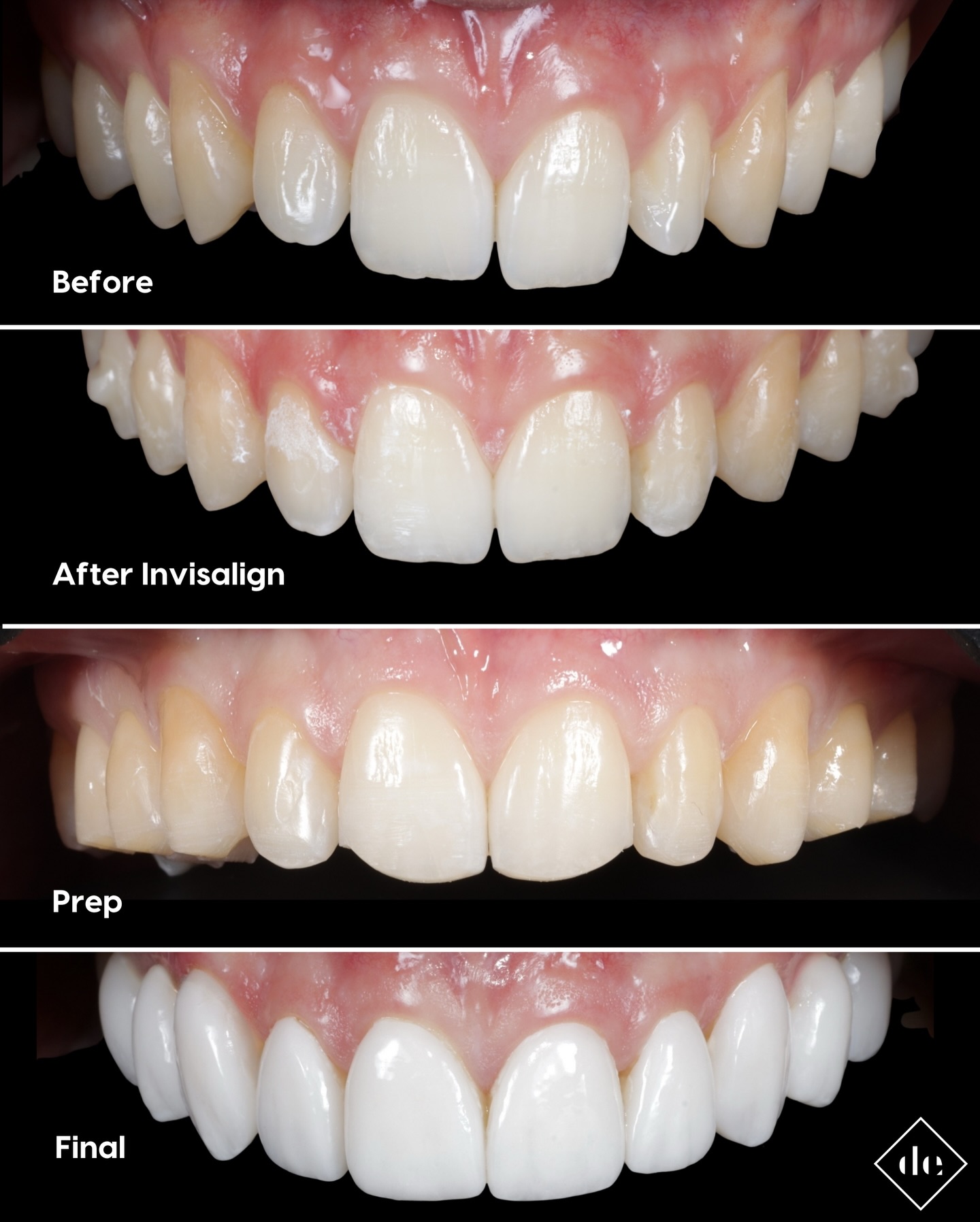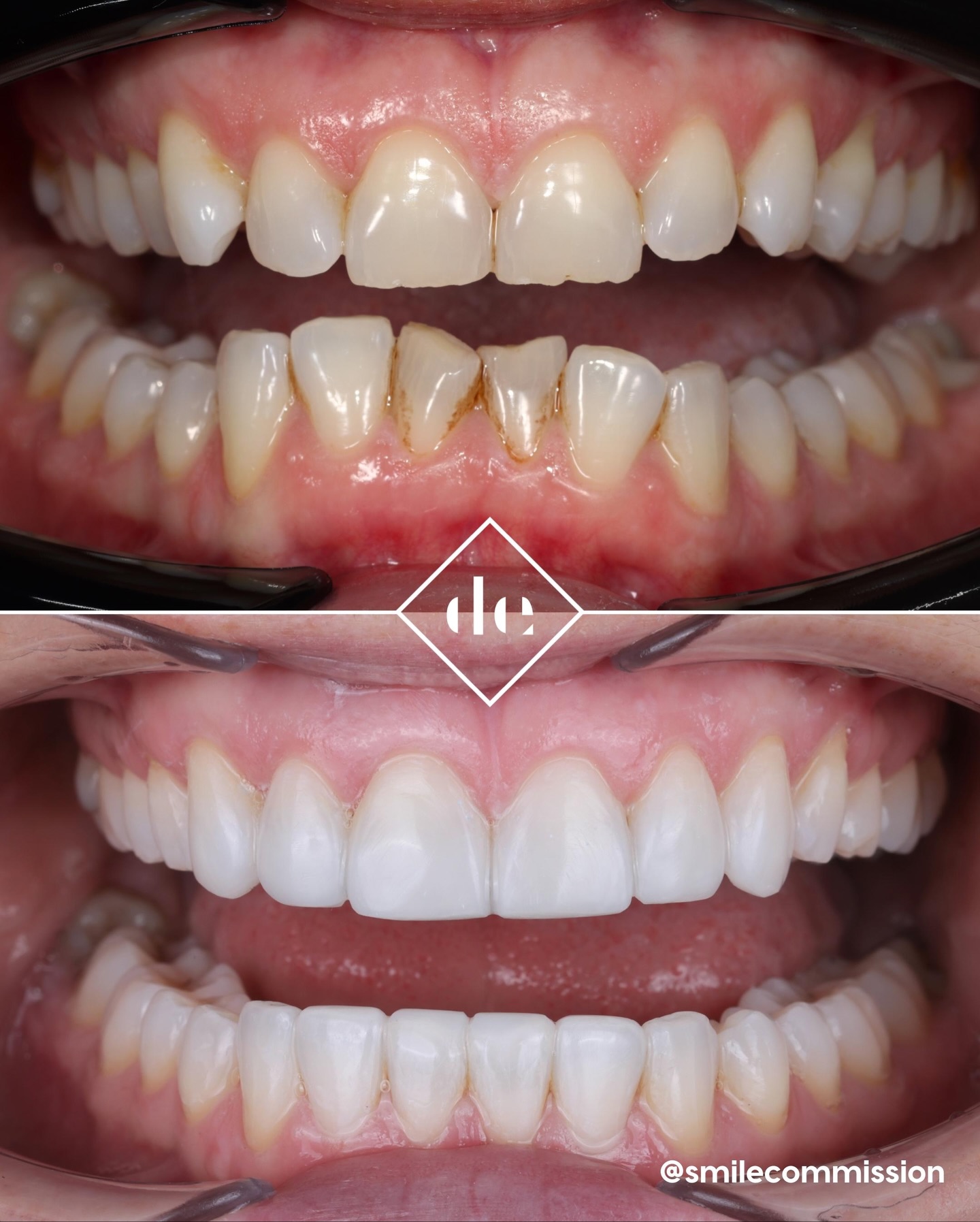Specialist dental hygiene appointments in Liverpool and Chelsea
Protect your teeth and gums with professional hygiene care in our calming, beautifully designed clinics. Whether it’s part of your routine or preparing for cosmetic treatment, we’ll help you maintain a healthier, fresher smile for life.

- Thorough cleaning to remove plaque and tartar
- Specialist periodontist who will put you at ease
- Personalised care to support your oral health
See the difference regular hygiene care can make
Many patients only think to visit the dentist when something feels wrong - but the truth is, the most powerful dental care is preventative.
Our hygiene team supports patients across Liverpool, Chelsea, Earl’s Court and Fulham with gentle, thorough cleaning that protects teeth, gums and restorations like veneers, composite bonding and dental implants. You’ll leave feeling fresher, healthier and more confident.

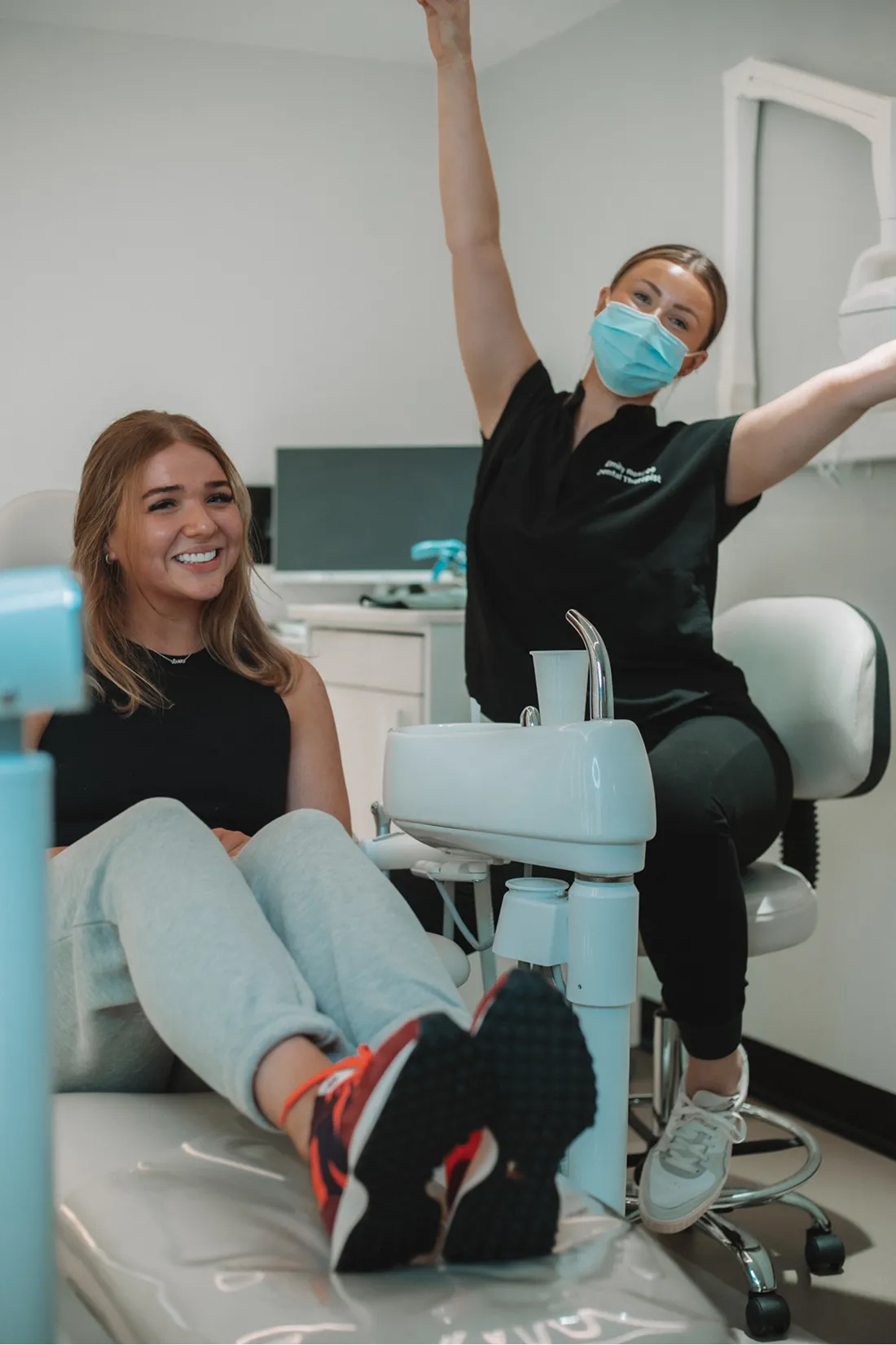
Gum health check
Your hygienist will examine your mouth and note any areas that need special attention.
Plaque and tartar removal
Using professional tools, we’ll gently remove hardened build-up from the teeth and gum line.
Polishing for a smooth, fresh feel
We’ll finish with a polish to lift surface stains and leave your smile looking brighter.
Advice tailored to your mouth
We’ll show you how to improve your at-home routine - from brushing and flossing to diet and products.
Referral or follow-up if needed
If we spot any concerns, we’ll guide you to the right general dentistry treatment for further care.
Dental hygiene at Dental Excellence
Regular hygiene visits are one of the simplest ways to protect your smile - and they’re for everyone, not just those with dental concerns. We’re trusted by patients across Garston, Speke, Kensington and beyond for supportive, non-judgemental hygiene care that fits around busy lives.
We recommend hygiene care every three to six months, especially if you:
- Have a history of gum disease or bleeding gums
- Have had composite bonding, veneers, or orthodontic treatment
- Want to keep your teeth looking and feeling their best
- Are preparing for cosmetic or restorative treatment
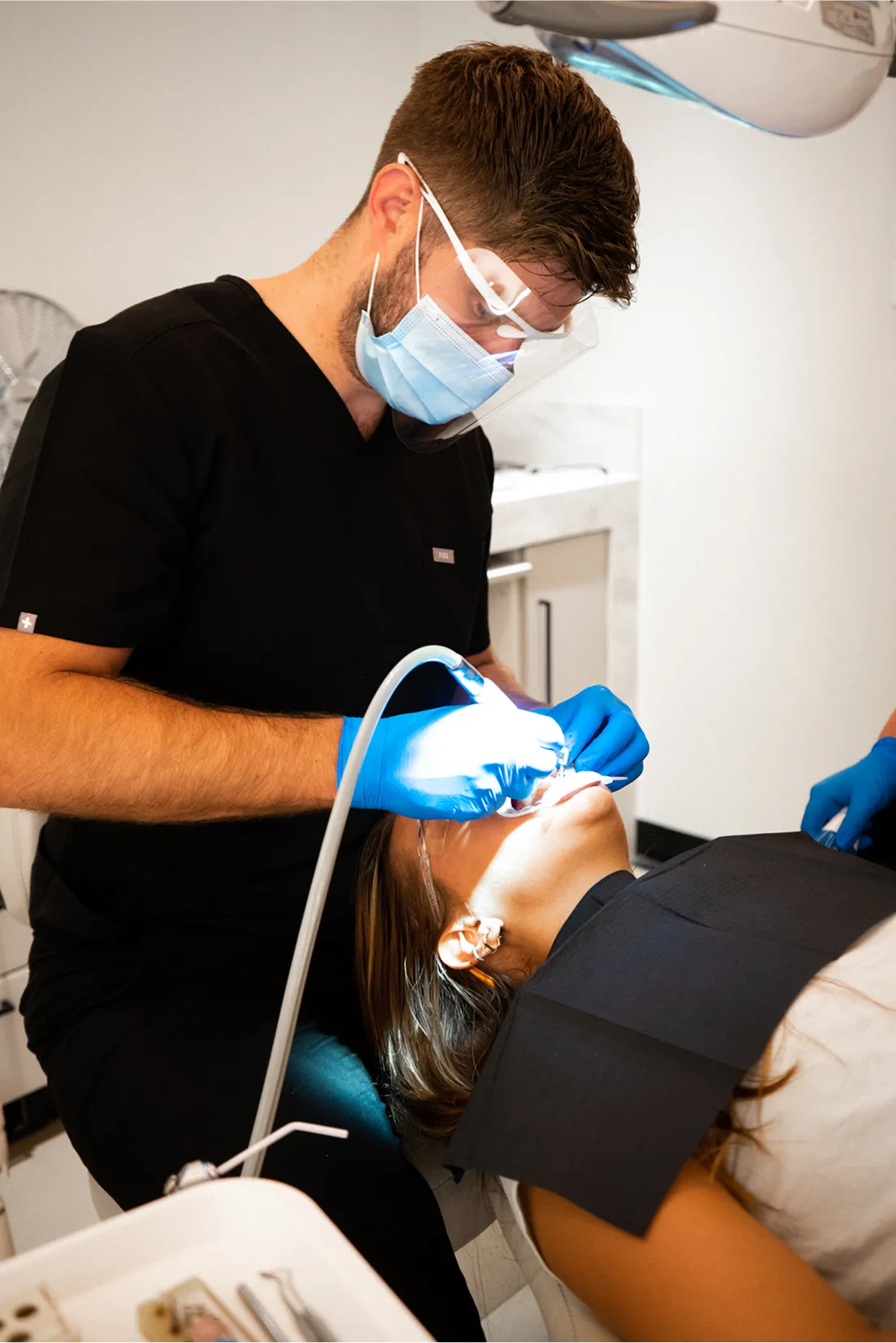

Our team of highly trained hygienists takes a gentle, human approach - no lectures or guilt, just honest care that fits your goals and lifestyle.
- £99 hygiene appointments
- Personalised care for patients of all ages
- Trusted by celebrities, families and professionals
- Support for patients with cosmetic or restorative dental work
How much does hygiene cost?
Dental hygiene appointments start from £99, with options to combine your visit with a check-up or smile makeover consultation depending on your needs.
You’ll receive a full breakdown of your care and recommendations for how often to return. Many patients choose to see our hygienist three times a year to maintain results from teeth whitening, bonding, or veneers.
For a full list of fees, visit our pricing page or speak to the team directly.





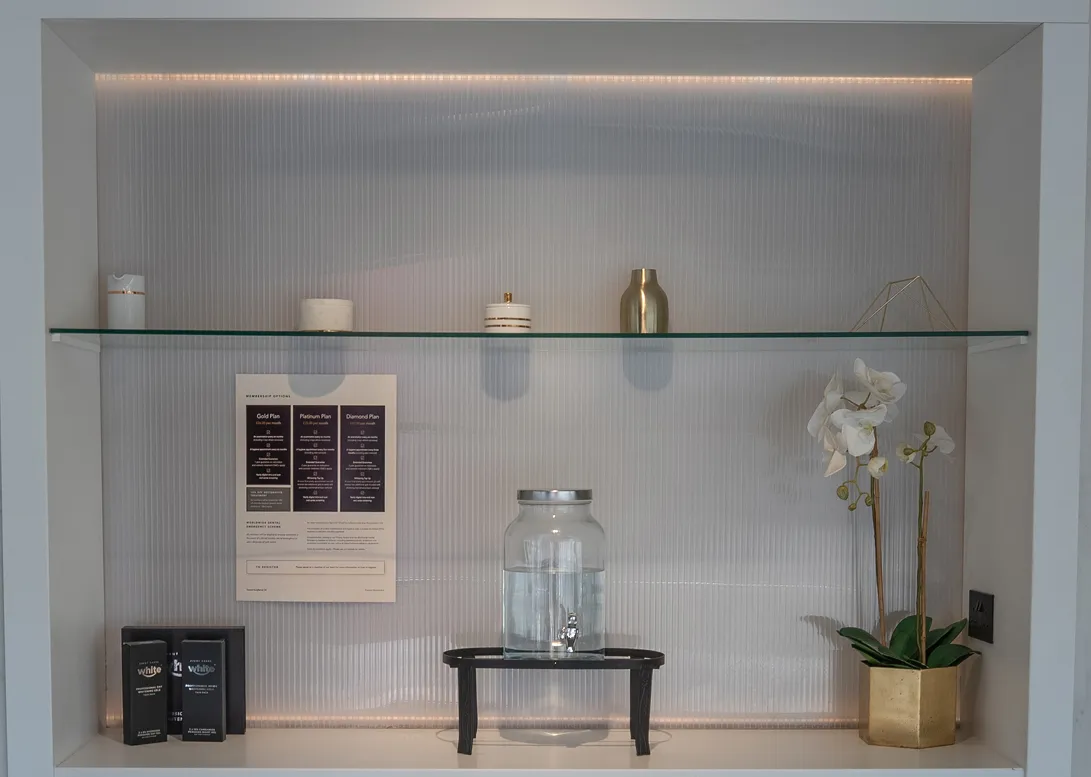

Specialist gum care
with Dr Khurram Hussain
For patients with complex gum issues, our in-house Specialist Periodontist Dr Khurram Hussain offers expert support and treatment. Trained at the prestigious Eastman Dental Institute and registered with the GDC and European Federation of Periodontology, Khurram is highly experienced in managing advanced gum disease, peri-implantitis and aesthetic concerns.
He works closely with our hygiene and restorative teams to provide:
- Treatment for bleeding gums, loose teeth and gum recession
- Support for failing implants and peri-implant disease
- Cosmetic gum recontouring to enhance smile aesthetics
Your hygiene questions answered by Dental Excellence
How do I clean in between my teeth?
One of the most important ways of preventing tooth decay and gum disease is by cleaning in between your teeth and removing harmful bacteria. These gaps in between your teeth can be some of the most difficult places to clean as they are hard to reach with a normal toothbrush. The best way to do this is by using other cleaning tools such as floss, to get directly in between each tooth. You should always use dental floss when you brush your teeth, to ensure you're cleaning every area of your mouth, including hidden gaps. If you don't properly clean in between your teeth, bacteria will be allowed to grow unhindered and the longer it's left, the more damage it will be able to do.
As the harmful bacteria is left on your tooth, it will begin to eat away at your enamel, causing tooth decay. This will eventually lead to cavities and begin to cause gum disease. By this point, you will begin to experience pain as your gums will be sore and swollen, meaning you need to act to prevent it from worsening. If this isn't prevented, you could suffer tooth loss, as gingivitis will develop into periodontitis, which causes the gums to pull away from the teeth, leading the infection to begin eating away at the bone which supports your teeth.If you keep on top of your oral hygiene, you will be able to prevent serious issues such as this from occurring but we understand that sometimes that may not always be possible. If you've faced tooth loss as a result of this, or tooth loss caused by another issue, we can offer a treatment that will help you. That treatment is dental implants, which is where we replace missing teeth with artificial ones, by fusing a titanium screw to the jaw bone. We then attach the tooth to the screw to secure it in place. By having this treatment you're not only able to have your smile repaired, but you're also filling a gap that was previously exposed, greatly improving your oral hygiene.
Can diet affect my oral hygiene?
Diet is one of the biggest factors which can affect your oral hygiene, especially if you eat a lot of sugary foods and drinks which are very acidic. The reason sugar is so harmful to your teeth is that it actually feeds the harmful bacteria on your teeth, causing more damage as the bacteria breaks down your teeth. This is why it's important to thoroughly and regularly brush your teeth after eating sugary foods. However, it's important to wait at least an hour before brushing, otherwise, you could simply move the sugar around your mouth rather than removing it completely.If the sugar which is sitting on your teeth isn't removed, it can cause tooth decay and gum disease - issues that can worsen if not treated.
Other factors of your diet can harm your teeth too, such as acidic foods, which can break down your tooth's enamel and weaken your gum line. If you persistently eat acidic foods, this will weaken the gum, exposing the nerve centre and causing sensitive teeth. Cutting down on the amount of sugary and acidic foods you eat, the better your oral health will be.
Other foods with strong colouring can affect the colour of your teeth too. Coffee and red wine have long been known to stain teeth due to their extremely dark colours. Tooth enamel can become discoloured and if you continue to drink these, the discolouration can become more serious. One of the best ways to combat this is by using a mouth rinse after drinking coffee or red wine, to prevent residue from the drinks sitting on your teeth. If the issues have become serious and you have permanent discolouration of your teeth or they are no longer as white as you would like, we can offer treatments to help restore your teeth.
One of the most popular treatments we offer is our Same Day Smile makeover which is where we'll use a composite material and apply it to your tooth which can improve the shape of your teeth as well as the colour. By using composite bonding or composite veneers, we're able to restore the colour of your teeth to a healthy and vibrant white. If you opt for composite veneers, where we apply a layer of composite material over your full tooth, you'll benefit from a treatment that can last up to 10 years, if you look after them properly.
Will drinking alcohol and smoking affect my teeth?
Smoking is one of the worst things you can do to your teeth and your overall dental health. The strong colour of nicotine can very quickly begin to discolour your teeth, turning them a yellow-ish colour. Those who smoke are also six times more likely to develop gum disease, which can lead to tooth loss. By smoking regularly, the gum becomes weaker, making it easier for bacteria to collect and begin to damage your teeth. Even other alternatives such as tobacco chewing gum can cause the same issues, as it will irritate the gums in the same way.
Alcohol is another drink that can be very harmful to your teeth, predominantly from the high sugar content. Cocktails, ciders and other fruity alcoholic drinks often contain a lot of sugar which can damage your gums and cause decay. There is also the setting to consider, for example, these types of drinks are often consumed at a bar or pub, meaning it's unlikely that you're able to brush your teeth soon after drinking the alcohol. This means you need to brush your teeth as soon as you get home as going to sleep with large amounts of sugar still on your teeth can speed up decay.
What are the signs of poor oral hygiene?
The most obvious indication that there may be an issue with your oral health is pain. Healthy teeth don't cause pain, so it is likely there is an issue with either your teeth or your gum, which is causing the pain. It's important you don't ignore the pain and instead use this as a prompt to visit the dentist and identify the issue before it worsens. Your gums are also another clear indicator of the quality of your oral health. If they are swollen or bleeding, it is likely there is an issue with your gums such as gum disease. Plaque build-up can cause your gums to swell and the longer this is left uncleaned, the more likely it is to develop into periodontal disease. Having a good oral care routine that you stick to is the best way to prevent oral diseases.Gums that have deteriorated over time leaving roots exposed is a clear sign of decay and an issue which you need to resolve.
Brushing and flossing regularly is a good way to prevent your condition from worsening. Another issue that could indicate poor oral hygiene is discolouration of the teeth, meaning there could be an issue with your dental care routine or your diet. A combination of both would cause issues to occur rapidly as eating a lot of sugary foods without brushing regularly can be extremely harmful to your teeth. Brushing soon after mealtimes, using effective equipment such as an electric toothbrush and cutting down on sugar where you can are some of the best ways to prevent poor oral hygiene.
If you've suffered issues with your teeth that have damaged your smile as a result of poor oral hygiene, we can offer treatments that will have you smiling again. Our Same Day Smile makeover is the most popular choice due to the short treatment time of a single day and the stunning results which we can provide. An initial consultation appointment will need to take place to ensure a same-day treatment is suitable for you and when it comes to treatment day, you'll be able to leave the same day with a new smile. You'll also be able to enjoy a film or music whilst we apply the treatment in our luxury Liverpool-based facility.
How do I maintain good oral hygiene after dental treatment?
Once you've received dental treatment, it's extremely important to maintain good oral hygiene to prevent issues such as discolouration or infection. We offer veneers (both composite and porcelain) as a treatment here at Dental Excellence, which can hide any discolouration of your teeth and make them appear a vibrant white colour. However, these materials are susceptible to discolouration too, so you will need to be very careful about which food and drink you consume otherwise you will damage the white of the veneer. The same applies to composite bonding as we use the same material, meaning you need to be extra careful with your diet as well as preventing any impacts to your teeth that could cause the material to become chipped.
If you’re having a dental treatment such as an implant, you will need to have a very good dental care routine to ensure that the gum surrounding the artificial tooth doesn't become infected. Our facility is completely sterile and all of our equipment is properly cleaned so there is no worry of infection when you're in our facility but after-care is extremely important. There will be plenty of appointments throughout the process to ensure your gums are healthy and that your oral care isn't causing any issues relating to the dental implant treatment.
With dental treatments such as braces, it is extremely important to maintain good dental care to prevent issues from occurring once the braces have been removed. Metal braces consist of brackets that are glued to each tooth and connected by wires, which cause the most issues when attempting to clean your teeth. The brackets, which are fixed to the tooth, need to be cleaned otherwise a ring of discolouration can be left once the bracket is removed. The wire which connects each bracket can also cause issues when brushing as it creates a barrier between your brush and gaps in between your teeth. This is why, when you have fixed braces, you need to floss and use mouthwash to get to hard to reach areas.
With brace alternatives such as Invisalign, it is equally important to ensure you have a good oral health care routine. It is, however, much easier to keep this up with clear aligners as the tray which is used for reshaping can be removed when eating and brushing teeth. This prevents food from getting trapped in the retainer and you can brush your teeth unhindered, making it far easier to keep them clean. You must also clean your retainer, just as you would your teeth, to prevent any harmful bacteria from collecting and being transferred to your teeth once you begin wearing the retainer again.
How can I get rid of yellow teeth?
If your teeth have become discoloured as a result of diet or other issues, there are treatments that we can offer to help you get your smile back. Composite bonding and veneers treatments can restore your teeth in more ways than one. By using the material we can rebuild your teeth to make them appear straighter and better aligned, as well as making them appear much whiter. When applying composite veneers, we will place a layer of the material over your entire tooth, whereas with a standard bonding treatment, we would only apply a small amount of the material to certain areas of your teeth.
When applying porcelain veneers, we will remove a thin layer of enamel from your tooth to make room for the porcelain veneers to be applied. If you care for them properly, porcelain veneers can last up to 15 years, making them a cost-effective treatment option. They do require more commitment than composite options, however, as we will need to make permanent changes to your teeth in order to fit them. Porcelain is also incapable of being stained, unlike your natural teeth, so the bright white of your teeth won't be lost over time.
What is good oral hygiene?
Good oral hygiene requires you to properly look after your teeth and gums which will consist of a good cleaning routine and a diet that doesn't contain large amounts of sugary foods. If your teeth don't hurt and your gums aren't swollen or bleeding, you will likely have good dental hygiene and those are the most common signs that there is an issue. Using an electric toothbrush and flossing are good ways to thoroughly clean your teeth and reach those tricky areas.
Maintaining good oral hygiene is an effective way to prevent more serious issues from occurring. If issues such as gum disease occur and aren’t treated, it can lead to a series of issues, including high blood sugar levels which can cause heart disease. Once you have received dental treatment from us you will also need to maintain good oral hygiene to ensure that your treatment isn't affected and that it doesn't cause more serious issues. Composite veneers, for example, can become stained just like your teeth, so a good oral health routine is key to keeping them a glowing white colour.
Can poor oral hygiene be reversed?
Yes, poor oral hygiene can be reversed, which is why it's important to stay on top of your oral health and ensure you do your utmost to protect your teeth. If you don't look after your dental hygiene, issues that would otherwise be preventable, can worsen and lead to more serious health issues. For example, if you get gingivitis (gum disease), and don't treat it, this will worsen and can affect your blood sugar levels. High blood sugar can lead to heart disease, which could have been prevented.
Diet can be a huge factor in poor dental hygiene, which is why you should always be careful of what you eat. If your current diet is causing a lot of dental health issues, you should change your diet to have less impact on your teeth and gums. Plaque build-up which can also cause poor dental health can be removed and if you continue to keep your teeth clean, you should see a dramatic improvement in the quality of your oral health.
Other issues such as crooked and missing teeth, which can lead to poor dental health, can be corrected by treatments we offer here at Dental Excellence. To begin planning your treatment with us today, don't hesitate to get in touch and book your consultation appointment.
Can treatment from Dental Excellence improve my oral hygiene?
Whilst we can't maintain your oral hygiene for you day-to-day, we do offer hygiene appointments to professionally clean your teeth and support you in keeping your mouth healthy. We can also offer a range of treatments that help restore your teeth if they've been damaged as a result of poor dental hygiene. Discolouration, crooked and missing teeth are all issues that we can fix through effective treatment.If your teeth have become discoloured, we can apply a veneer of either composite material or porcelain to restore your tooth to its bright white colour. In the case of porcelain veneers, they are unable to be stained in the same way your natural tooth can be, meaning you can enjoy bright white teeth for far longer.
Composite veneers are less commitment but they typically only last for 5 to 7 years, meaning you may need a touch-up appointment to ensure they remain looking their best.Missing teeth can also cause issues with dental hygiene as the gum is exposed, leaving that area more susceptible to infection. To fix these issues, we can offer a dental implant treatment that replaces the missing tooth with an artificial one that both repairs your smile and protects the previously exposed area. Throughout the process of having a dental implant fitted, we'll ensure your mouth is healthy and that your gums and jaw have settled enough to have the implants.
There are other issues that can make maintaining good oral health difficult, such as crooked teeth, which can create hard to reach areas due to the teeth not being properly aligned. Severe crookedness can create gaps between teeth that harbour lots of harmful bacteria and can be very difficult to brush due to the position of the teeth. One effective way to combat this and enjoy a stunning, perfectly aligned smile as a result would be through Invisalign, a series of clear aligners that will gently and effectively correct your teeth, realigning them whilst ensuring they remain fully natural.
Is it worth seeing the hygienist if I brush and floss daily?
Yes - professional cleaning removes hardened plaque (calculus) that you can’t remove at home, helping prevent gum disease and bad breath.
Does hygiene treatment whiten teeth?
Not in the same way as composite bonding, but it often helps lift surface stains and restore brightness, especially for smokers or coffee drinkers.
How often should I have a hygiene appointment?
Most people benefit from a clean every three to six months. We’ll recommend a schedule that fits your health and lifestyle.
Do I need to see a dentist before I book hygiene?
No - you can book a hygiene visit directly or as part of your . We’ll guide you through the best next steps.
Will it hurt?
Our hygienists work gently and go at your pace. If you have any sensitivity or anxiety, we’ll make adjustments to keep you comfortable.

